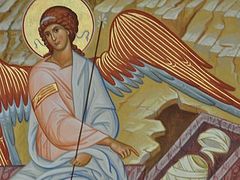Before the Sacrament of Baptism there is a rite in which we spit on satan, and join ourselves to Christ, and the Creed is pronounced. These are solemn and important moments. But they are often accompanied by curious incidents… I mean errors in the text of the Creed. Sometimes it is caused by the excessive excitement of those who are being baptized (I am speaking here of adults), sometimes it can be explained by their inattention to what is going on. In some cases these mistakes are innocent, in other cases they are outrageous. Sometimes they are typical, but sometimes are very surprising.
One of the typical errors is usually heard towards the end of the Creed. “I confess one Baptism for the stopping of sins,” instead of, “I confess one Baptism for the forgiveness of sins.” This is what I have heard already many times, and I just smile (in Russian the words “forgiveness”, or, to be more exact, “remission”, and “stopping” sound and are spelled very much alike: compare “ostavleniye” and “ostanovleniye”). I like this unintentional interpretation: such a slip of the tongue gives you hope that the catechetical talks before Baptism were not in vain and the person realizes what he or she is doing: This sacrament brings not only the annulment of the sinful past, but also the protest against all future sins. As the Apostle John says, We know that whosoever is born of God sinneth not; but he that is begotten of God keepeth himself, and that wicked one toucheth him not. And we know that we are of God, and the whole world lieth in wickedness (1 Jn. 5:18-19).
It seems to me that now the world is not merely lying in the wickedness—it keeps sliding down to ever more bitter evil, to the infernal abyss. It is like a train moving at full speed on a straight and broad track, on the reliable and durable rails of sins and passions. This train’s passengers are travelling in cars of varying comfort levels, but the atmosphere everywhere is similarly stifling. The passengers know that they should while away the time throughout their journey with carnal pleasures, games and spectacles, “pulp fiction” reading and so on. Rumors and gossip are spreading from car to car, often turmoil breaks out here and there, but the people do not care.
And suddenly one passenger comes to realize that he already, Loveth not the world, neither the things that are in the world (1 Jn. 2:15). Instead, this person grows in love for God and faith in the Savior; he knows that he and the passengers on this vicious journey are going different ways. He shows great determination and pulls the emergency brake, receiving Holy Baptism for the remission and stopping of sins.
The train wheels are squealing, like the drowning Gadarene pigs, and the horned and tailed engine driver is uttering dirty curses. All are poking their fingers at the disturber of the “peace”—condemning, ridiculing and threatening him. But he has already left.
The train will start off again and will gain great speed. But I believe that every conscious Baptism that people receive with sincere repentance postpones the end of our universe and keeps the last days from coming; for, There is joy in the presence of the angels of God over one sinner that repenteth (Luke 15:10). In the sacrament of Baptism one must experience a mysterious rejection of identifying with this world.
That is the way it usually goes. But sometimes it goes different way.
At times someone on the train also pulls the emergency brake, imitating the previous bold spirit. Some do it out of boredom, wishing any kind of change in their lives. They suppose that this lever calls the janitor or conductor (they are too lazy to read the instructions attached nearby). But nothing happens at all. The train has not stopped, so the passengers shrug their shoulders and return to their bunks.
Levers are one thing, but brakes are another thing. In the physical material world there is a mechanical link between them, but in the spiritual word this link is a special, spiritual one, for The wind bloweth where it listeth (Jn 3:8). But will it wish to blow in the life of a person who is pleased with everything in this world as it is?
“I confess one Baptism for the forgiveness of sins.” I hear the perfect harmonious singing of the Creed by the church choir at the Liturgy, but I add quietly to myself this incorrect, but so appropriately used word: “and for stopping… and for stopping!”





